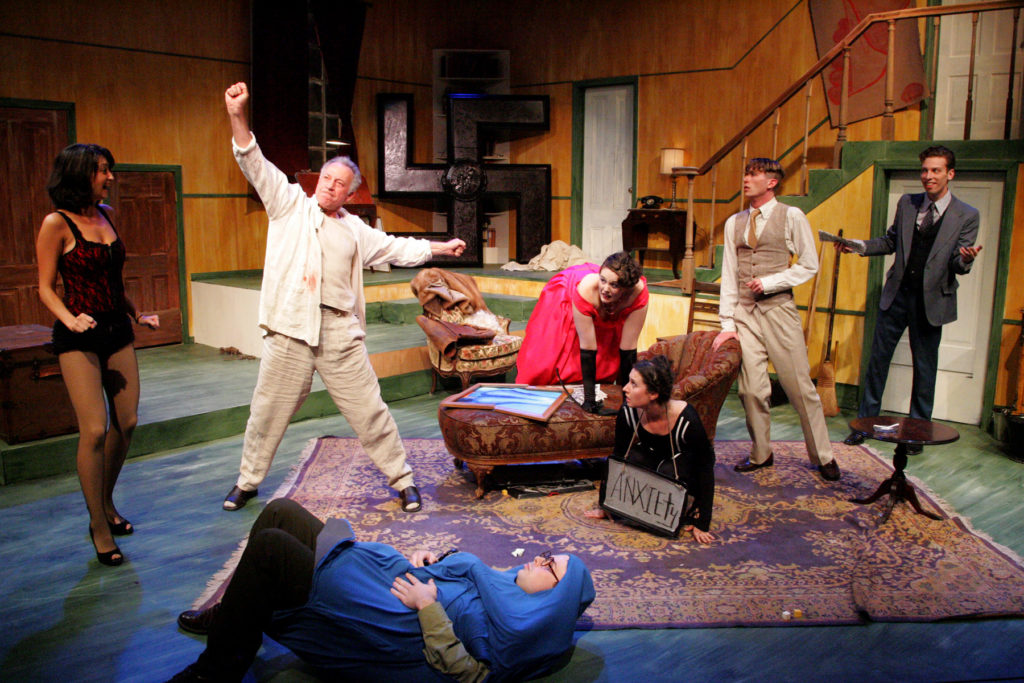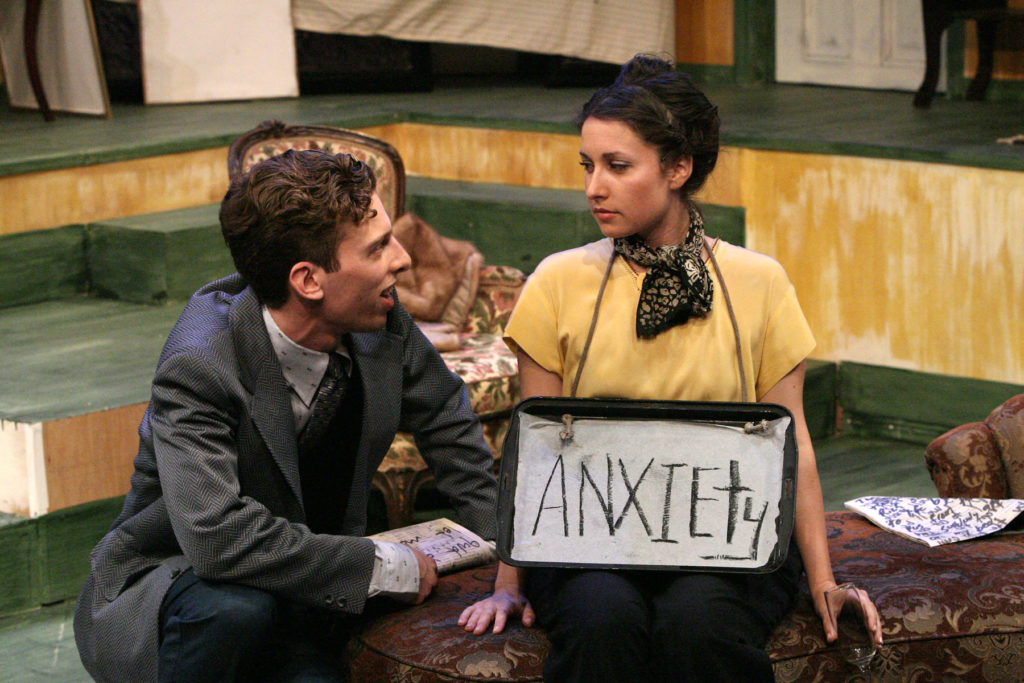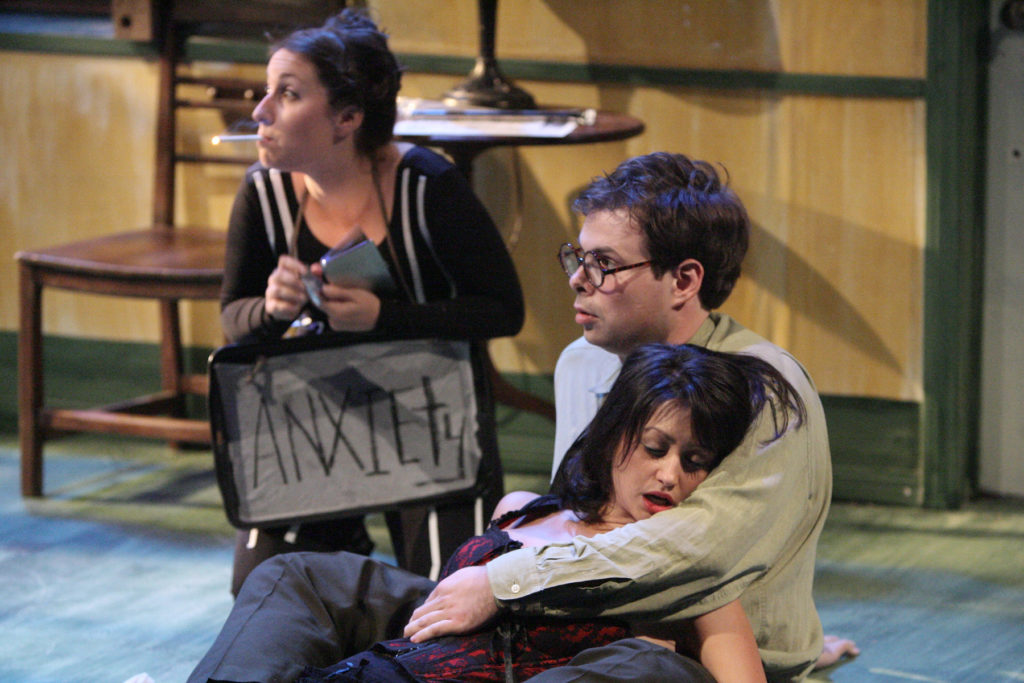GOOD THING PICASSO STUCK TO HIS DAY JOB
When addlepated Michel Leiris (pronounced LAY-REE) pops out of the upstairs bedroom in his darkened Paris home to prepare for the visit of Pablo Picasso, he begins a series of pratfalls, antics and missteps that thrust us into the world of farce. Early into Act I of Leiris/Picasso at the Bootleg Theatre, the set is festooned with crudités, broomsticks, and a giant bronze Swastika. A Nazi is tied up in the closet and writer Albert Camus (Tyler Jenich) is giving acting lessons to existentialist Jean-Paul Sartre (Patrick Baker). What we have is a brilliantly promising Kaufman and Hart-esque set-up for the living room-premiere reading of Picasso’s play, which is not only performed in defiance of Nazi occupation, but by such cultural luminaries as Simone de Beauvoir (Amy K. Harmon) and Samuel Beckett (Dan Gordon).
Unfortunately, the premise gets suffocated by a clash of stylistic choices in every area of the Brimmer Street Theatre Company production.
Writer/director David Jette has taken on some very complicated responsibilities. First, one of the greatest unwritten laws of the theatre is to avoid directing one’s own material, as it skews the perspective necessary to make a cohesive and comprehensive show. Second, for farce to play well, it must be grounded in reality. Knocking out a Nazi with a plunger, for example, may make for a funny sight gag, but we need to believe that it is possible if we are to relate to the situation. Third, farce, which involves slamming doors, misconstrued intentions, dalliance, and oversized personalities, is a style that demands the tightest timing and razor-sharp vocal delivery.
This isn’t to say that Mr. Jette hasn’t created a fine premise, some wonderful stage pictures, inventive blocking and Algonquin Club-like dialogue (Camus calls himself the “atheist angel of justice”). But even with the best of intentions and glimmers of possibilities, this inconsistent outing comes up short of true farce again and again.
The company is led by Michael Bulger as Leiris. His comic timing, brilliant pratfalls and authenticity make him a most sympathetic fellow, especially since he has a social-climbing, hen-pecking wife, Zette (Jenny Byrd, owner of some splendidly funny moments). Mr. Bulger is clearly the front-runner in the hard-working and earnest cast; he proves himself to be a sparkling farceur.
Mr. Baker plays Sartre with the requisite whiny, droll and pedantic flavor. His timing, however, feels stiff, forced, and broad. Mr. Jenich gives us a likeable Camus, but he seems to have stepped out of an episode of Father Knows Best. Fred Ochs as Picasso displays an over-the-top Master, so consistently big that he would be more suited to a musical comedy. Joseph L. Roberts’ non-threatening Nazi displays an odd Euro-trash accent; his delivery would be better-suited for Hogan’s Heroes.
All of these different styles make a realistic premise all the more far-fetched and confusing. What if Dali, Picasso, and Hopper painted on the same canvas? You get the picture.
The design team alternately succeeds and suffers. Juliana de Abreu’s scenic design feels theatre-of-the-absurd and dreary, hinting at the Nazi’s siege on Paris, but what is that exquisite French credenza doing by the kitchen? Priscilla Watson’s costumes hint at a style from 1944 (she succeeds with Zette’s gown) but they seem a mishmash of decades fore and aft of this period. Same with the hairstyles — some are positively spot-on and others are simply wide of the mark.
Picasso actually wrote the truly awful play, Desire Caught by the Tail, that we view snippets of in Act II. But when the aforementioned literati sink their teeth into it, hilarity does not ensue. Poor Sartre is forced to wear an outfit that looks like a single grape from a Fruit-of-the-Loom commercial (the costume material is clearly not from 1944). Picasso’s play is performed as if it had already been rehearsed: the cast has scripts in hand, but delivers lines with perfect memorization. It doesn’t matter that some individual moments work well enough; we are never onboard for this enterprise.
The full title of Mr. Jette’s play is Wednesday Night at the Home of Michel Leiris: a Reading of the Play ‘Desire Caught by the Tail’ by the Painter Pablo Picasso. Whew! It’s no wonder it’s sold as Leiris/Picasso. The title is long, confusing and almost off-putting. So is the first act. At over ninety minutes, it is nearly exhausting, made even more frustrating by the constant influx of astonishingly good set-ups that never pay off. And therein lies the irony; they cut the title to sell it; now edit the play to make it more palatable.
Mr. Jette may consider making this a Three-Act play, the construction of most comedies prior to 1944. The first act could end upon Picasso’s arrival; the second might be the rehearsal of the reading, and the Act III is the disastrous reading itself. Then, the admirable Mr. Jette could hand the piece over to a more suitable director who avoids substance over style. Even Michael Frayn’s Noises Off (certainly one of the best farces ever put on paper) cannot play well without a farce Maestro leading it. Mr. Jette has many fine instincts, but he has not cut his teeth in a manner befitting one who could helm Grand Farce.
Moss Hart discovered in his first outing with George Kaufman that an entire act of their play had to be tossed in order to bring the project to fruition. Picasso’s play stinks; it can not be rewritten. It would be rather exciting to see if Leiris/Picasso could be. Most of the elements are already there. Good luck, Mr. Jette.
photos by Michael Lamont
Wednesday Night at the Home of Michel Leiris:
A Reading of the Play “Desire Caught By The Tail” by the Painter Pablo Picasso
Brimmer Street Theatre Company
Bootleg Theater
ends on July 24, 2010
for tickets, call 213.290.2782 or visit Brimmer









